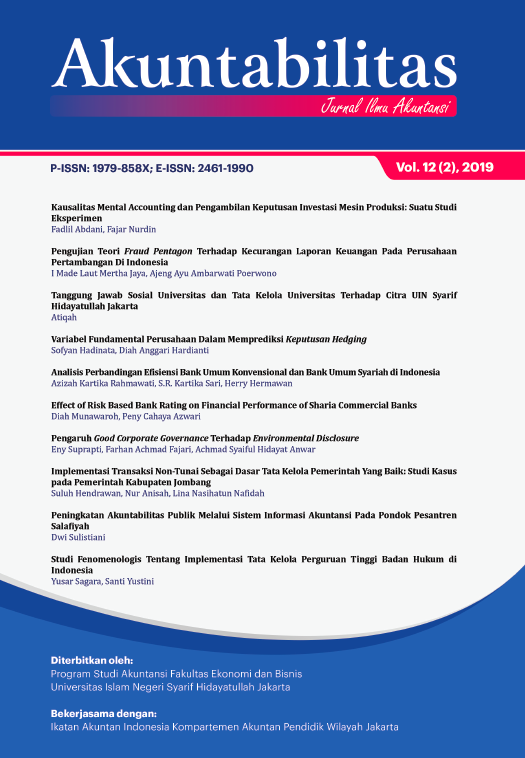Kausalitas Mental Accounting dan Pengambilan Keputusan Investasi Mesin Produksi: Suatu Studi Eksperimen
DOI:
https://doi.org/10.15408/akt.v12i2.11703Keywords:
mental accounting, self efficacy, behavioral accounting, decision makingAbstract
This research is included in the true experiment which aims to test the main effect and the interaction effect of mental accounting and self efficacy on investment decisions on production machinery. The method used is the true experiment, with the design of 2 x 2 between subjects that uses two levels of mental accounting (existing or absent) and two levels of self efficacy (high or low). Statistical tests are used with ANOVA, for the first and second hypotheses using One Way Analysis of Variance and for the third hypothesis using Two Way Analysis of Variance. The results of the study found that mental accounting proved to influence the investment decision making of production machinery. Self efficacy is also proven to have an effect on investment decisions in production machinery. While the interaction effect between mental accounting and self efficacy does not affect the investment decision making of a production machine.References
Bakar, S., & Yi, A. N. C. (2016). The Impact of Psychological Factors on Investors’ Decision Making in Malaysian Stock Market: a Case of Klang Valley and Pahang. Procedia Economics and Finance, 35, 319-328. https://doi.org/10.1016/S2212-5671(16)00040-X.
Bandura, A. (1978). Self-Efficacy: Toward a Unifying Theory of Behavioral Change. Advances in Behaviour Research and Therapy, 1(4), 139-161.
Biyanto, F. (2001). Hubungan Pembingkaian Informasi Anggaran, Tanggung Jawab, Dan Pengalaman Terhadap Pilihan Keputusan Pada Investasi Berisiko. Disertasi Tidak Dipublikasikan. Yogyakarta: Universitas Gadjah Mada.
Dewanti, P. W., Priantinah, D., & Kurniasari, W. A. (2018). Mental Accounting dalam Keputusan Investasi. Jurnal Akuntansi, 6(1), 75-87. https://doi.org/10. 24964/ja.v6i1.687.
Duxbury, D., Keasey, K., Zhang, H., & Chow. S. L. (2005). Mental Accounting and Decision Making: Evidence under Reverse Conditions Where Money Is Spent for Time Saved. Journal of Economic Psychology, 26(4) 567–580.
Eveline, F. (2010). Pengaruh Adverse Selection, Pembingkaian Negatif, Dan Self Efficacy Terhadap Eskalasi Komitmen Proyek Investasi Yang Tidak Menguntungkan. Jurnal Akuntansi dan Manajemen, 21(2), 181–198.
Farrell, L., Fry, T. R. L., & Risse, L. (2016). The Signifcance of Financial Self-Efficacy in Explaining Women’s Personal Finance Behaviour. Journal of Economic Psychology, 54, 85-99. https://doi.org/10.1016/j.joep.2015.07.001.
Ghozali, I. (2006). Aplikasi Analisis Multivariate Dengan Program SPSS. Semarang: Badan Penerbit Universitas Diponegoro.
Kahneman, D., & Tversky, A. (1979). Prospect Theory: An Analysis of Decision under Risk. Econometrica, 47(2), 363–391.
Kahneman, D., & Tversky, A. (1984). Choices, Values, and Frames. American Psychologist, 39, 341–350.
Montford, W., & Goldsmith, R. E. (2016). How Gender and Financial Self-Efficacy Influence Investment Risk Taking. International Journal of Consumer Studies, 40(1), 101–106.
Nagy, R. A., & Obenberger, R. W. (1994). Factors Influencing Individual Investor Behavior. Financial Analysts Journal, 50(4), 63–68. https://doi.org/ 10.2469/faj.v50.n4.63
Nahartyo, E., & Utami, I. (2016). Panduan Praktis Riset Eksperimen. Jakarta: Indeks.
Porter, M. E. (1989). How Competitive Forces Shape Strategy. In Asch, D., & Bowman, C. (eds). Readings in Strategic Management. London: Palgrave.
Reed, A. E., Mikels, J. A., & Löckenhoff, C. E. (2012). Choosing with Confidence: Self-Efficacy and Preferences for Choice. Judgement and Decision Making, 7(2), 173-180.
Rengku, R. B. (2012). Faktor Internal Dan Pengaruhnya Terhadap Risk Perception dan Expected Return Perception. Journal of Business & Banking (JBB), 2(2),185–198.
Ritter, J. R. (2003). Behavioral Finance. Pacific-Basin Finance Journal, 11(4), 429–437. https://doi.org/10.1016/S0927-538X(03)00048-9.
Seiler, M. J., Siler, V. L., & Lane, M. A. (2012). Mental Accounting and False Reference Points in Real Estate Investment Decision Making. Journal of Behavioral Finance, 13(1), 17-26. https://doi.org/10.1080/15427560.2012. 653293.
Thaler, R. (1985). Mental Accounting and Consumer Choice. Marketing Science, 4(3), 199-214. https://doi.org/10.1287/mksc.4.3.199.
Whyte, G., Saks, A. M., & Hook, S. (1997). When Success Breeds Failure: The Role of Self Efficacy in Escalating Commitment to a Losing Course of Action. Journal of Organizational Behavior, 18(5), 415-432.
Whyte, G., & Saks, A. M. (2007). The Effects of Self-Efficacy on Behavior in Escalation Situations. Human Performance, 20(1), 23-42. https://doi.org/ 10.1080/ 08959280709336927.

